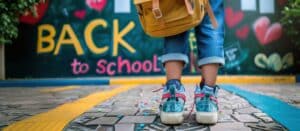As a parent, you are very committed to helping your child to get ready for school. But it can feel like an overwhelming task. You might ask if you need to buy workbooks and special games and flashcards? What if you don’t have the money? And we know how busy parents are. So maybe you are worried about the time that it will take to prepare your child for school.
The good news is that there are LOTS of things you can do help your child get ready for school that don’t cost money and do not take a lot of extra time. In fact, you can use things that you do every day as teaching opportunities by embedding learning into your activities.
What do we mean by “embedding learning”? When you do this, you use an ordinary task or daily routine to teach your child something new or practice a skill. The task can be something as simple as washing hands before dinner or putting toys away. And you can practice all sorts of skills while you do these things, like counting (fingers, toys), matching (fingers on the right hand to fingers on the left, Legos by shape or color), letter sounds (“What’s the first sound in ‘finger’?”), or learning left and right.
As adults, we sometimes forget that children are like little sponges. They soak up new ideas and skills. That means that almost ANY activity can turn into a learning adventure!
Let’s take an ordinary walk, for example. Say you have to go somewhere, down the street to the bus stop, to the store, or just out for a stroll. There are LOTS of ways that you can embed learning in this activity:
- Point out different objects and name their shapes or colors, like “See that road sign there? It is a square. And it is orange.” “What shape would you call that fire hydrant?…The bottom is shaped like a cylinder….Do you know what that is?…It’s round like the tube from a roll of toilet paper.”
- Talk about how the weather feels. “Do you think it is hot or cold today?…That’s right. It feels kind of hot…How do you know? Can you feel the sun heating you up?” Talking like this teaches your child vocabulary words and how to use information from her senses to make judgments.
- Look for letters on signs. Have your child name them or name them for him. Practice making the sound of the letter.
- Have your child tell you what they hear. This helps practice listening skills and focusing their attention..
- Make up stories about things that you see. “That bus sure looks full. Where do you think it is going?….Do you think the people on the bus are going grocery shopping?…What are they going to buy?” This helps your child to practice vocabulary and also putting together stories.
Helping your child to practice skills that will be important for school does not need to be expensive and it does not need to take extra time out of your day. You can make up all sorts of games and learning adventures throughout your day! What kinds of things do you like to do to embed learning in your everyday activities? Share some of your favorites with us!
[divider type=”standard” text=”Go to top” full_width=”no” width=”1/1″ el_position=”first last”]
Image: © Kostiantyn Geraschchenko| Dreamstime.com





